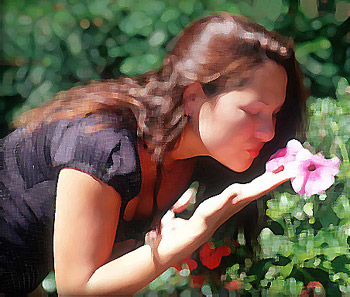
Fourth Annual Wild Violet Writing Contest Winners (2006)
Fiction
— First Place
Since retiring from college teaching eight years ago, Wayne Scheer has published numerous stories in print and on the Internet in The Christian Science Monitor, The Pedestal, Monday Magazine, Stone Table Review, Amarillo Bay and Wild Violet. His writing awards include a Pushcart Prize nomination.
Autumn
Moon
By Wayne Scheer

When I saw her at Doc's funeral she was talking to two women her own age.
Although engaged in conversation, she seemed alone. Nearly thirty years
had passed, but she still looked as if she lived inside herself and, like
a turtle, only poked her head out temporarily.
I knew that look well. It broke my heart when we were both in our twenties. I thought I loved her. She said she loved me, but something in her deep, dark eyes frightened me. Oh, she was kind and gentle, funny and affectionate, a much more intelligent, spirited and passionate woman than I could appreciate at the time. Still, I was smart enough even then to know that I would never meet anyone like her again in my life.
What frightened me, I came to discover, was my own insecurity.
She was a graduate student in economics, with an interest in developing nations. I was preparing to teach high school English. She had already arranged to join the Peace Corps after she finished her degree. I held vague hopes to write a novel.
She thought we should marry and join Peace Corps together. "Think of the stories you'd have. The experiences."
Again, I was afraid.
If not for my fear, we might have married. Of course, we'd be divorced by now. She could never have lived in my cozy, limited world, and I could never have resided in her borderless universe.
I can still hear our words when we broke up. "I don't think I'm strong enough to be with you," I said.
"I see."
That was it. No tears, no attempt to refute my self-assessment. A year of intense conversations about politics and literature, passionate sex and confessions of love ended with a simple, "I see."
She reached across the table — we were in a booth at a small, neighborhood bar — squeezed my hands, and said, "It's a beautiful spring evening. I'd like to walk home."
I stood, planning on walking her to the small apartment she shared with another graduate student.
"No. I'd like to walk home alone." She kissed me on the lips and said good-bye. Her eyes never betrayed her feelings. They were already somewhere else.
That was the last time I had seen her until now.
"Claudia?" I asked, approaching her and the two women. I was surprised at how short her hair was. She had gained a few pounds, but looked better than I remembered.
I could see she didn't recognize me at first. My once dark hair was now gray, a mostly white beard covered my face. I was ready to forgive her.
"Jason. I don't believe it. It's been... a long time." She held out her arms, and we hugged. Despite all the time that had passed, there was an instant familiarity in the embrace, the way she patted my back and kissed me on the neck. I fear I held her a bit too long.
She turned towards the women she was with and introduced us. We talked about Doc. It turned out that she and the women were cousins of the man I'd known as Doc for over twenty years. I explained that I had met him at a teachers' conference back in the eighties, and we had kept in touch. "I'd visit him, and he'd come see me and my family in Madison where I'm living now." I turned to Claudia. "I can't believe he was your cousin. It really is a small world."
We added in unison, "But I wouldn't want to paint it." It was an old joke we repeated from a favorite comic of ours. When she laughed, she opened her mouth wide and made a peculiar gurgling sound. I remembered how out of character her laugh was in contrast to her usual reserved intensity.
The women shook hands with me and excused themselves. We mumbled something about wishing we had met under better circumstances. I felt a little guilty about our laughter, considering where we were.
As soon as we were alone, Claudia asked, "So, you live in Madison? Married? Children?
"Yep," I said, trying to sound casual. I told her about my family and asked about her.
"Married twice, divorced twice. I'm afraid, I'm just not in one place long enough to stay married." She explained that she worked with the U.N. and would just as likely be in China or Turkey than the U.S. any given day.
"Must be exciting," I said.
"Sometimes. I also spend a lot of time in airports trying to remember where I'm going."
It seemed callous, of course, as I listened to my old friend's eulogy, but I felt a sense of anticipation, even arousal, at reconnecting with Claudia. I remembered telling Doc about her once. While splitting a pitcher of beer, we confessed our regrets like two old-timers. He admitted he had found high school teaching so comfortable he never attempted to turn his dissertation on the history behind the Hamilton-Burr duel into a book, as planned, just as he found bachelorhood so secure, he never opened himself to the idea of marriage. I had moved on to college teaching and eventually an associate professorship at the University of Wisconsin, but I admitted that I had chosen the comfort of academia over ambition. That's when I told him about "the one who got away." I told him how life with her probably would have pushed me to have attempted more. "Maybe if I had married her, I would have finished my novel."
"So?" Doc was my age, but he had a way of speaking as if he were the old wise man come down from the mountain. "The world has one less book on the 50 percent off table, but you have a good marriage and two fine children. Would a novel have made you happier?"
Of course not, I wanted to say. But to be honest, I wasn't sure. There was a time when I wished I dared to be a writer, to put aside everything and focus on my art, but I had a family. I played with the novel on weekends, but eventually it gave way to Little League and piano recitals, barbecues and lawn mowing. I loved my wife and kids, and the quiet, secure life we led, but I still held doubts about giving up the novel.
Now that Claudia and I were arranging to meet at a restaurant near the hotel where I was staying, I felt new doubts.
"I'll meet you at 7," she said. "I want to spend time with my family. We have a lot of catching up to do." She smiled, and raised her eyebrows in a gesture I recalled well. "And so do you and I."
I knew I was reading into her smile worse than a freshman English student interpreting a Sylvia Plath poem, but a flood of memories overwhelmed my usual rational thinking. As I paid my respects to Doc, I wondered if he was getting some kind of cosmic kick at the moral dilemma he had gotten me into by dying.
"Hey," I imagined him saying. "I'm the one dead, remember? You're supposed to be feeling sorry for me. Besides, what moral dilemma? You're having dinner with an old friend. Nothing more — unless you choose more." I could see Doc shrugging his shoulders, repeating his favorite expression: "Things work out the way they work out."
He was no help at all.